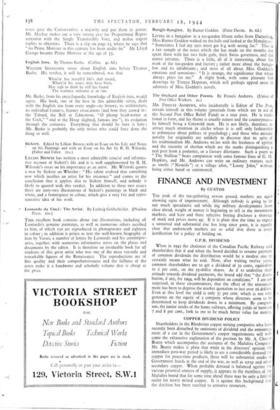FINANCE AND INVESTMENT
By CUSTOS
THE peak of the tax-gathering season passed, markets are again showing signs of improvement. Although nobody is going to lec out much speculative sail while big military developments loom close ahead, weight of money is beginning to tell in the investment markets, and here and there selective buying discloses a shortage of stock and prices move up. If it is plain that the time to expect a sustained and substantial rise has long since gone, it is equally clear that underneath markets are so solid that there is ev' justification for a policy of holding on.
C.P.R. DIVIDEND
When in i943 the chairman of the Canadian Pacific Railway toli shareholders that if and when thr.: board decided to resume payment of common dividends the distribution would be a modest one lit certainly meant what he said. Now, after waiting twelve years, common shareholders are to get a dividend of 50 cents, equivalent to 2 per cent., on the 25-dollar shares. As if to underline their attitude towards dividend payments, the board add that 'the distri- bution, if any, for 1944, will be dependent on conditions." I am not surprised, in these circumstances, that the effect of the annotr, ment has been to depress the market quotation to just over z6 doi, Even at this level the yield is only 34- per cent, which is not %ter, generous on the equity of a company whose directors seem to be determined to keep dividends down to a minimum. By compari- son, the junior stocks of the home railways, offering yields of betw2 7 and 8 per cent., look to me to be much better value for mo
COPPER DIVIDEND POLICY
Shareholders in the Rhodesian copper mining companies who hak recently been disturbed by omissions of dividend and the announce- ment of a cut in the Government's copper requirements will wel- come the exhaustive explanation of the position by Mr. A. Che- Beatty which accompanies the accounts of the Mufulira Comp Mr. Beatty makes it plain that while in the directors' opinion immediate post-war period is likely to see a considerable demand for copper for peace-time products there will be substantial stocks in Government hands at the end of the war, as well as scrap and other secondary copper. When probable demand is balanced against ti various potential sources of supply, it appears to the members of the ivittfulira board that for some time ahead there may be only a limi outlet for newly mined copper. It is against this ,background it1= the decision has been reached io conserve resources.


























 Previous page
Previous page